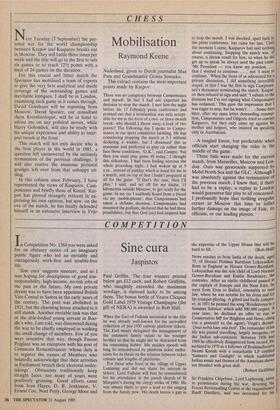CHESS
Mobilisation
Raymond Keene
Next Tuesday (3 September) the per- sonal war for the world championship between Karpov and Kasparov breaks out in Moscow. They will battle three times per week and the title will go to the first to win six games or to reach 121/2 points with a limit of 24 games on the duration.
For this crucial and bitter match the Spectator has mobilised a team of experts to give the very best analytical and inside coverage of the outstanding games and inevitable intrigues. I shall be in London, examining each game as it comes through, David Goodman will be reporting from Moscow, David Spanier, our consultant chess Kremlinologist, will be at hand to advise me on any political moves, while Harry Golombek, will also be ready with his unique experience and ability to inter- pret trends at the front.
This match will not only decide who is the best player in the world in 1985, a question left unanswered by the untimely termination of the previous challenge, it will also resolve the immense personal grudges left over from that unhappy en- ding.
In this column since February, I have represented the views of Kasparov, Cam- pomanes and briefly those of Kinzel. Kar- pov has proved strangely reticent in ex- pressing his own opinion, but now, on the eve of the match, he has finally defended himself in an extensive interview in Vrije Nederland, given to Dutch journalist Max Pam and Grandmaster Genna Sosonko. This extract contains the most important points made by Karpov:
There was no conspiracy between Campomanes and myself. In fact I had not expected his decision to stop the match. I met him the night before his 15 February press conference and pointed out that a termination was only accept- able for me in the form of a two- or three-month break: why should I throw away a lead of two points? The following day I spoke to Campo- manes in our sport committee building. He was considering stopping the match at 5-3 without declaring a winner, but I dismissed this as nonsense and preferred to play on rather than face those conditions. 'O.K.', said Campo, 'but then you must play game 49 today.' I thought this ridiculous. I had been feeling nervous the whole preceding night, I had woken up at 9 a.m., instead of midday which is usual for me in a match, and on top of that I hadn't prepared at all for the game. 'If that's the case, then I'll play,' I said, and set off for my dacha, 15 kilometres outside Moscow, to get ready for the game. In my car I suddenly heard from a friend via my `mobilophone', that Campomanes' had taken a definite decision. Campomanes had mounted the podium, declared that he had three possibilities, but that God (sic) had inspired him
to stop the match. I was shocked, sped back to the press conference, but came too late. Until the moment I came, Kasparov had said nothing about continuing. Stopping the match was, of course, a dream result for him, so when he did get up to speak he always used the past tense: 'Mr President — you knew my position. . . • that I wanted to continue. . . .' not 'I want to continue.' When the three of us adjourned for a private discussion, I did something incredibly stupid, in that I was the first to sign Campoma- nes's document terminating the match. Kaspar- ov then refused to sign and said: 'I submit to the decision but I'm not signing what Campomanes has ordained.' This gave the impression that I was eager to stop, but he wasn't. . . . Some days later, after my open letter demanding resump- tion, Campomanes and Gligoric tried to contact Kasparov, but they only came up against his mother and helpers, who insisted on speaking only in Azerbaijani.
A tangled forest, but predictable when officials start changing the rules in the middle of the game.
Three bids were made for the current match, from Marseilles, Moscow and Lon- don. Ours was generously supported by Mobil North Sea and the GLC. Although I was absolutely against the termination of the previous match, I knew that, if there had to be a replay, a replay in London would guarantee fair play to all concerned. I profoundly hope that nothing irregular occurs in Moscow this time to inflict further damage on the image of Fide, its officials, or our leading players.










































 Previous page
Previous page